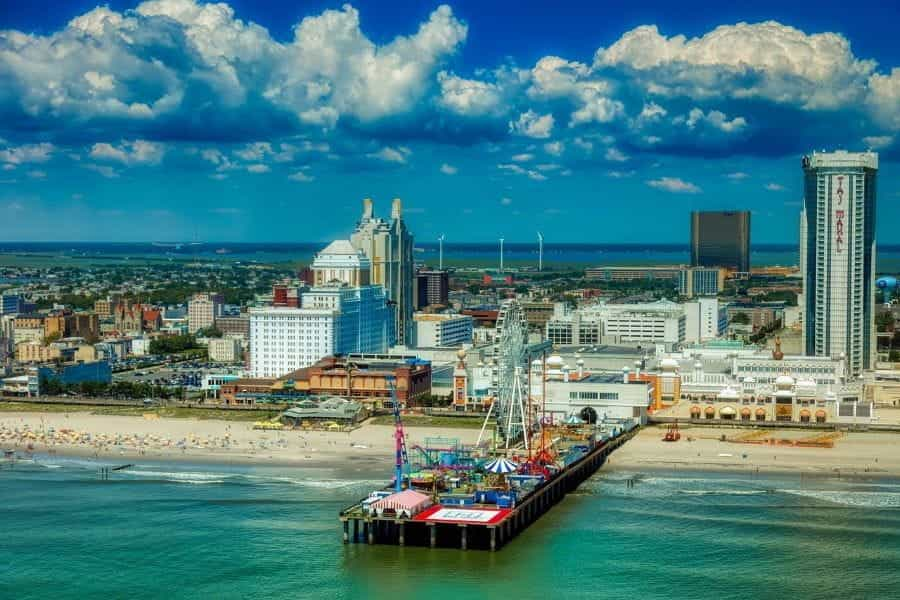Massive Layoffs at Atlantic City Casinos
According to the Casino Association of New Jersey, local casino jobs have contracted by 4,200 from where they were last year — with more layoffs looming. As the coronavirus pandemic has raged through the summer, mandating that casinos operate on a fraction of their normal visitorship, casino owners have explained that there is simply not a need for the same number of employees as have been necessary in previous summers.

New Jersey’s Atlantic City casinos have been hard-hit for years, even before COVID-19. ©1778011/Pixabay
In fact, trouble had been brewing over Atlantic City for a long time preceding the coronavirus crisis — a trend that has surely not been helped by months of forced closures and/or fragmentary reopening since the coronavirus pandemic hit the United States, beginning in March 2020.
A Tough Run Several Years Ago
Throughout the mid-2010s, Atlantic City really began to have some trouble — perhaps in a delayed response to the 2008 recession. From 2014 to 2016, the economic struggles in Atlantic City hit their peak, prompting local officials to push for the legalization of sports betting and online gambling.
During the apex of Atlantic City’s casino financial crisis, more than 11,000 workers lost their jobs. At the time, there were twelve casinos in Atlantic City, and five were forced to close in the devastating two year period. After New Jersey Governor Chris Christie pushed to legalize sports betting and iGaming, things started to turn around.
In 2018, officials were finally successful in their quest. A shift to diversified income — as many casinos would find in 2020 — proved to be the saving grace for Atlantic City casinos, which managed to bolster their revenue through 2018 and the first half of 2019, with a brief upswing once again at the beginning of 2020.
After a solid performance for the first six months of 2019, Atlantic City casinos then slumped again through the rest of the year. By August 2019, profits had fallen in Atlantic City by close to 7%, with 4% of employment contracting.
A Resurgence At the Beginning of 2020
Then, in January of this year, it seemed that Atlantic City’s luck was turning around for the better. The city declared around $3.3 billion in revenue for 2019, which tracks: since online gambling and sports betting was only legalized in 2018, 2019 was the first full year for these laws to take effect in Atlantic City.
As was close to immediately evident, the newfound lenience towards sports betting and regulated online gambling breathed new life into Atlantic City’s gambling industry, which had long been struggling. All in all, Atlantic City’s casinos made 15% more in 2019 than in 2018, making a combined $3.46 billion of casino income and sports betting revenue.
In early 2020 and before we knew that the coronavirus would also hit our shores, it was clear that the introduction of sports betting and online gambling would already grow into a substantial portion of the city’s revenue. By the end of 2019, the combined industries made up 18% of Atlantic City income.
Since Coronavirus, Ongoing Difficulty
Tragically, then, the upswing of 2019 into early 2020 was not to last for long. By March 16, all of the casinos in Atlantic City were forced to close indefinitely, and they did not reopen again for over 100 days. Customers were once again welcomed into Atlantic City casino locations in July, but, of course, nothing was the same.
In the months since March, Atlantic City casinos have reduced employment by around 4,250 jobs compared to last year. As of today, Atlantic City’s nine casinos have around 24,900 employees, but many — perhaps as many as 50% or more — have been furloughed indefinitely, and do not know when they will be able to come back to work.
Just last week, Atlantic City officials also announced that they would be severely cutting down on the number of J-1 visa workers they accept: meaning, instead of hiring international migrant employees, they’ll instead be hiring locals. The J-1 visa often means that workers can be paid somewhat less than locals, so this will mean higher costs overall.
Safety Protocols Mean A Different Gambling Experience
As with many casinos around the world, when Atlantic City casinos finally did reopen in July 2020, guests were welcomed by unusual sights. Today, casinos in Atlantic City can welcome only 25% of the visitorship that they normally can: a toll that’s sure to hurt during the summer, what is normally peak season for tourism.
This is a bit more strict than many other casinos: in other cities, casinos are operating at 50% capacity — still a tough line, but not as stringent as Atlantic City’s new measures. Additionally, there is no more dining within Atlantic City casinos, nor will gamblers be allowed drinks on the gambling floor.
Some Casinos Have Managed To Stay Strong
Still, not every casino has been hammered by restrictions on visitorship since reopening. In a number of states, casino revenue bounced back to numbers equal or greater to revenue before the coronavirus pandemic, in January/February of this year. This included casinos in Ohio, Oklahoma, and Indiana, among others.
A Long Road Ahead
Atlantic City officials are not mincing words about the prospects ahead, even just for 2020. As summer winds to a close, the coming months will see kids back in school and cooling weather. Tourists will be less inclined to visit a cold place like New Jersey, and gambling enthusiasts may as readily go to warm cities like Las Vegas.
Even still, the troubled past of Atlantic City over the last decade has served to strengthen the resilience of city and industry officials alike, who are unwilling to see this as a challenge worthy of giving up over. As one industry member said, this is not the first time Atlantic City’s gambling industry has faced what looked like insurmountable odds.



